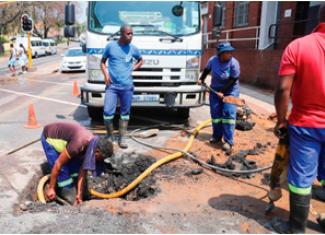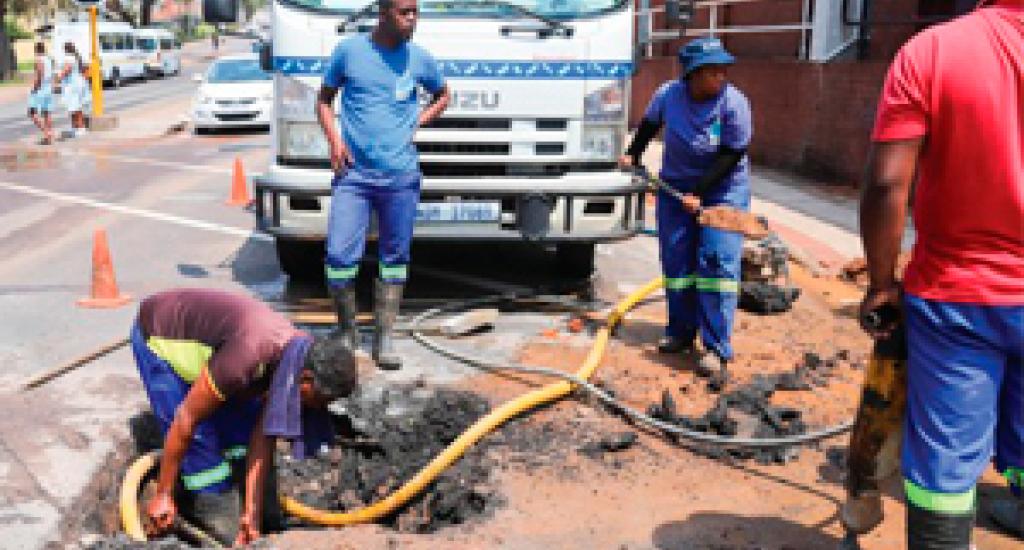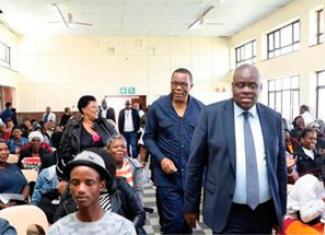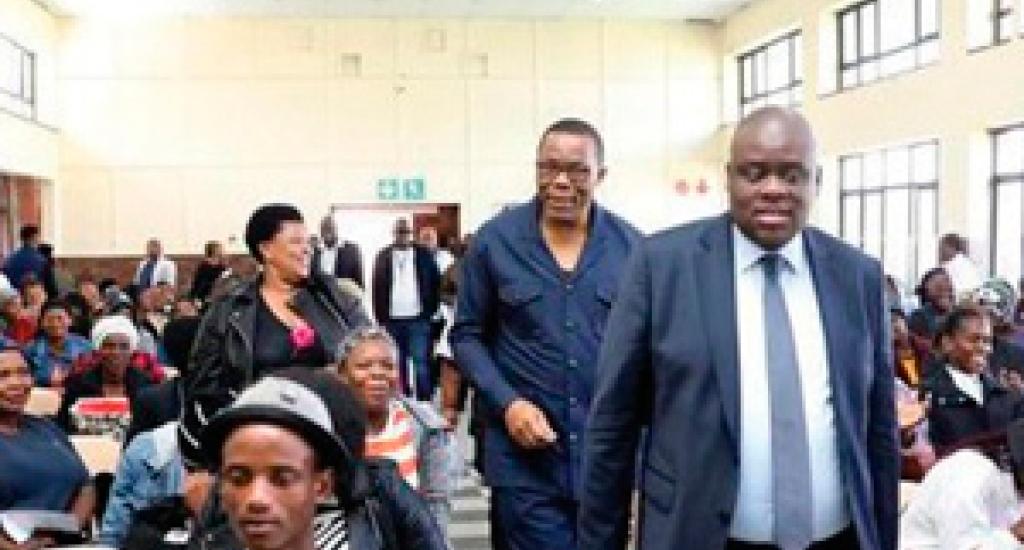Xaba maps
out his plan for eThekwini
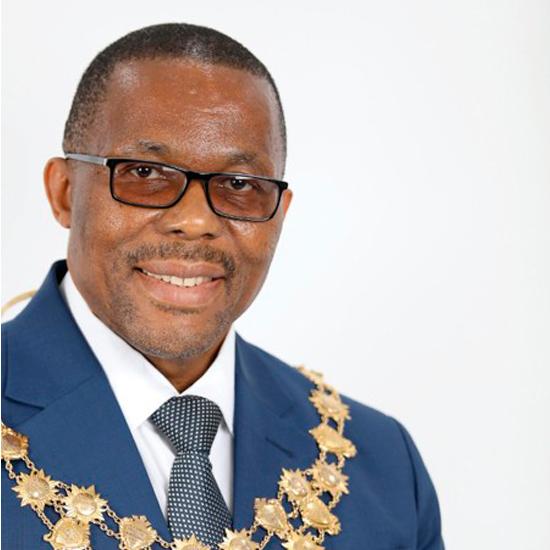
The past four years have seen eThekwini Metropolitan Municipality plunge into a vortex of tumultuous spells that have threatened to cripple KwaZulu-Natal’s only metro municipality. When the mayoral chain became vacant in June, seasoned politician Cyril Xaba was assigned with taking over the reins of returning the city to its former glory. In a recent sit-down interview with Public Sector Manager magazine, Xaba said he was familiar with the challenges he has been alloted.
He said: “The reception was reassuring. Not only to me but I think to the residents of eThekwini that the city has found a leader who is going to join hands with other leaders and deliver on the city’s objectives.” Although his arrival was largely met with a warm reception, there were some sceptics. “Even people that were doubting, we will show them that when working together, nothing is impossible. We will realise the objectives of a ‘caring a liveable city',” he said. The former provincial and national assembly legislator has nothing but glowing words for his predecessor, saying he had inherited a functional city. “The systems are there. The finances are stable. On that front, I can tell you that we can take it to the next level,” he said.
Honing in on the city’s state of affairs, Xaba concedes that there are areas of concern that were giving him sleepless nights. “It is the basic things. If you look at the statistics from the SAPS, they tell you that there are areas in the city where crime figures are still very stubborn – they are not going down. That concerns me a great deal. Secondly, it is an economy that is not creating jobs,” he said.
The mayor bemoaned what he described as little to no construction sites in the metro, which was the case a few years ago. “That is an indicator of an economy that is not growing. But just recently, the team took me to various sites of development that are supported by the city. I was excited to see yellow plants, something I had not seen for many years in the city,” he said. He said this excluded construction work undertaken by SANRAL on the N2 and N3 highways.
The recent developments he observed were an indication that the Metro was turning the corner and city’s economy was bouncing back. “We only have to do a few things to sustain the green shoots we are seeing,” he said.
Water shortages
Another area that needed urgent attention for the mayor was the ongoing water shortages plaguing the municipality. The challenges in this regard, like in many areas in the country facing a similar problem, was the issue of ageing infrastructure.
Xaba said the crisis was beginning to impact on the city’s ability to effectively provide water to residents. “What we are picking up now is the demand exceeding supply. If our infrastructure was in good condition, and we did not have the leaks, I think the city would have sufficient water to meet all our demands,” he said.
Because eThekwini is the only metro in KwaZulu-Natal, it is inundated with people from across the province, thus stretching the city’s limited resources, especially in its under resourced informal settlements. “The number of informal settlements are not going down. They are not going down at a time when the city is running short of land to build houses to accommodate more people. That is another challenge that we are facing,” he said. Overall, however, besides issues that arise on an ad hoc basis, he confident that the metro is functioning optimally, adding that only strong leadership was needed to “get things done.”
Stakeholder Engagement
Since assuming office in July, Xaba has held various engagements with formations of business, civil society, labour, religious and traditional leaders, as he sought to fully grasp the issues that need to be addressed. This, he said, was critical. “Even before I decide on my top priorities as a new mayor, I need to listen, consult and talk to the different sectors and groups so that anything I develop somewhat address some those issues. If you do not do that, you create a gap between yourself and people who are in a position to help you build,” he emphasised.
He conceded that there was litany of areas that required urgent attention if the contract investment in the city, especially in the Central Business District. Chief among these was the ease of doing business, saying business leaders he had engaged with had cited issues such as red tape in the approval of building plans and permits, among others.
Above this, the lingering issue of crime that continues to plague the metro needed to be addressed. “It is especially the case with these bad buildings that we have in the city. We have to clean the city. It is one of my top priorities. Tourists must be able to come to the city, we must take advantage of our warm weather – the beaches, our hospitality sector that will compete with the rest of the world,” he said.
His council has already begun to address some of these areas. In April 2022, as the city was recovering from the devasting effects of the COVID-19 pandemic lockdowns, it was hit by crippling floods that destroyed infrastructure to the value of billions of rands. Almost three years later, eThekwini is still picking up the pieces, revealed the mayor.
“While the economy is starting to pick up again, growth has not reached satisfactory levels. That you still have graduates that our economy still cannot absorb, tells you that you are still facing a challenge. It happened at a time when the economy was starting to pick up from the COVID-19 pandemic,” he said.
The two events are sandwiched by the unprecedented violent unrest that hit large parts of the province. The unrest saw many businesses looted and destroyed. “When you have so many people unemployed, it means you have fewer people to collect revenue from. As we speak now, I am not happy that our capital expenditure is at the level it is. Management and I need to have a conversation on that because I am not very happy. There needs to be a strong capex to be in a position to drive infrastructure that will sustain economic growth,” he said.
Corruption
Turning his attention to the question of corruption in the city, Xaba said malfeasance was bound to thrive when there were no consequences for wrongdoing.
“Even when the Auditor-General and City’s Integrity and Investigation Unit has made damning findings against some employees and there are no consequences, it becomes an invitation to other people to undermine processes. We have got to step up on that. You do that and you will see the results,” Xaba concluded.



